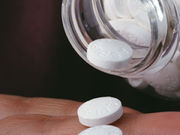No link to decreased risk of death or thrombotic complications after surgery
WEDNESDAY, Feb. 24, 2016 (HealthDay News) — Preoperative aspirin does not lower risk of death or thrombotic complications among patients undergoing coronary artery surgery, according to research published in the Feb. 25 issue of the New England Journal of Medicine.
Paul S. Myles, M.D., M.P.H., of Monash University in Melbourne, Australia, and colleagues used a two-by-two factorial design to randomly assign patients who were undergoing coronary artery surgery, and who were at risk for perioperative complications, to receive aspirin (100 mg) or placebo. In the other component of the trial, patients were randomly assigned to receive tranexamic acid or placebo. The primary outcome was a composite of death and thrombotic events, including nonfatal myocardial infarction, stroke, pulmonary embolism, renal failure, and bowel infarction.
The researchers note that in the aspirin component of the clinical trial, 1,047 patients received aspirin and 1,053 patients received placebo. A primary outcome event of death or thrombotic complication occurred in 19.3 percent of patients in the aspirin group and 20.4 percent of those in the placebo group (relative risk, 0.94; 95 percent confidence interval, 0.80 to 1.12; P = 0.55). The adverse effect of major hemorrhage leading to reoperation occurred in 1.8 percent of patients in the aspirin group and 2.1 percent of those in the placebo group (P = 0.75); cardiac tamponade occurred in 1.1 and 0.4 percent, respectively (P = 0.08).
“Among patients undergoing coronary artery surgery, the administration of preoperative aspirin resulted in neither a lower risk of death or thrombotic complications nor a higher risk of bleeding than that with placebo,” the authors write.
Bayer Pharma, which supplied the aspirin and matched placebo tablets, partially funded the study.
Full Text (subscription or payment may be required)
Copyright © 2016 HealthDay. All rights reserved.








